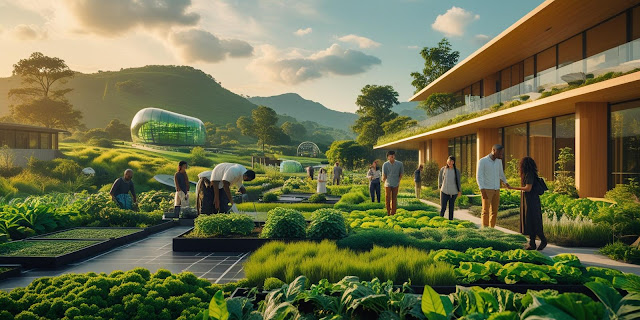At its core, sustainable development is about meeting the needs of the present without compromising the ability of future generations to meet their own.
When we add the vision of a liveable planet, we focus not only on survival, but on human dignity, thriving ecosystems, and just societies. It’s about creating a world where both people and the planet flourish together.
The Three Pillars of Sustainability
Sustainable development rests on three interconnected pillars:
-
Environmental sustainability: Protecting ecosystems, reducing emissions, and using resources wisely.
-
Social sustainability: Ensuring equity, access to services, human rights, and cultural resilience.
-
Economic sustainability: Promoting inclusive growth, meaningful work, and innovation that doesn’t destroy our life support systems.
Rather than standing apart, these pillars rely on one another to succeed. A liveable planet depends on weaving them together into a coherent vision and actionable strategy.
Climate Change: The Defining Challenge
Climate change is the most pressing threat to planetary livability. From devastating floods to prolonged droughts, we are already witnessing the impacts. The IPCC warns we are dangerously close to crossing key planetary boundaries.
To address this, we need a rapid and just transition away from fossil fuels. This includes:
-
Massive investments in renewable energy, particularly solar and wind, ensuring access to clean power for all.
-
Green transportation systems — including electrified public transport, cycling infrastructure, and walkable cities.
-
Climate-resilient agriculture that protects biodiversity, sequesters carbon, and feeds communities.
-
Reforestation and ecosystem restoration efforts that prioritize local communities and indigenous knowledge.
Yet decarbonization alone is not enough. We must change how we live, consume, and relate to nature.
Beyond GDP: Redefining Prosperity
Our current economic model is based on endless growth, measured by GDP — a metric that ignores environmental degradation and social well-being.
To make sustainable development real, we must redefine prosperity to include:
-
Well-being indices like the Genuine Progress Indicator (GPI), Human Development Index (HDI), and Gross National Happiness.
-
Circular economies that design out waste and keep materials in use.
-
Localized economies that support regional food systems, craft industries, and democratic cooperatives.
In other words, the economy must serve people and planet — not the other way around.
Cities and Communities: Ground Zero for Change
More than half the world’s population lives in cities, making urban areas the frontline of sustainable development.
Liveable cities are compact, connected, and clean. They feature:
-
Affordable housing near transit and jobs
-
Renewable-powered infrastructure
-
Access to parks, culture, and essential services
-
Zero-waste systems and local food markets
-
Safe, inclusive public spaces that promote community
Urban resilience also means preparing for climate shocks through green infrastructure, flood-resistant design, and social safety nets.
At the same time, rural areas must be revitalized with sustainable farming, renewable energy, broadband access, and decent jobs so people are not forced to migrate due to poverty or climate disaster.
Technology and Innovation: Tools for Good
Technology can be an ally — or an accelerant of harm.
We must steer innovation toward ecological and social goals:
-
Open-source climate solutions, like community solar cooperatives and decentralized energy grids
-
AI and data science for optimizing energy use, monitoring deforestation, or enhancing disaster response
-
Biodesign and biomimicry for creating materials and products inspired by nature
-
Digital inclusion, ensuring that tech advances do not widen inequality but empower people everywhere
Crucially, innovation must be governed responsibly with ethics, transparency, and the public good at heart.
Justice at the Heart
No sustainable future is possible without justice. This includes:
-
Climate justice: Rich nations must support poorer countries with finance, technology, and capacity-building — not just as aid, but as reparative justice.
-
Gender justice: Women and girls are disproportionately affected by environmental crises yet are powerful agents of change.
-
Intergenerational justice: Decisions today must account for the rights of future generations.
We must amplify marginalized voices, especially indigenous communities who have protected biodiversity for millennia.
Education and Culture: Shaping Mindsets
True transformation goes beyond policy. It requires a shift in worldview.
Education systems must teach not only math and science, but:
-
Ecological literacy
-
Systems thinking
-
Empathy and ethics
-
Global citizenship
Art, storytelling, and culture have an equally vital role in envisioning alternatives, challenging destructive norms, and sparking imagination.
A liveable planet begins in the human heart.
Global Cooperation, Local Action
While global frameworks like the UN Sustainable Development Goals (SDGs) provide vital direction, real progress depends on local implementation. Cities, communities, small businesses, youth movements — all are crucial actors.
We need:
-
Cross-sector partnerships that break silos between governments, businesses, civil society, and academia.
-
Citizen assemblies and participatory planning, empowering people to shape their own futures.
-
Transparency and accountability to track progress and prevent greenwashing.
The road ahead is complex — but possible.
A Vision Worth Pursuing
A liveable planet is not a utopian dream. It is a vision grounded in necessity, dignity, and possibility.
Imagine a world where:
-
Rivers run clean, and forests thrive
-
Everyone has food, shelter, and purpose
-
Cities are vibrant, green, and safe
-
Economies regenerate rather than deplete
-
People live not in fear of collapse but in hope of renewal
This is the world sustainable development seeks to build.
It is not easy. But it is worth everything.
About Me
I'm Luka Jagor — a digital artist, climate advocate, and writer exploring futures at the intersection of sustainability, creativity, and social justice. I'm passionate about the potential of artificial intelligence as a tool for everyday assistance, and I'm on a journey to master AI not just as a creative partner, but eventually as a way of programming — in my own style, beyond the dominance of Python. Check out my website: www.luka.jagor.info

.jpg)
Comments
Post a Comment